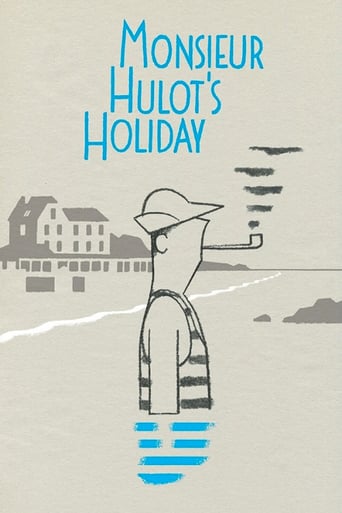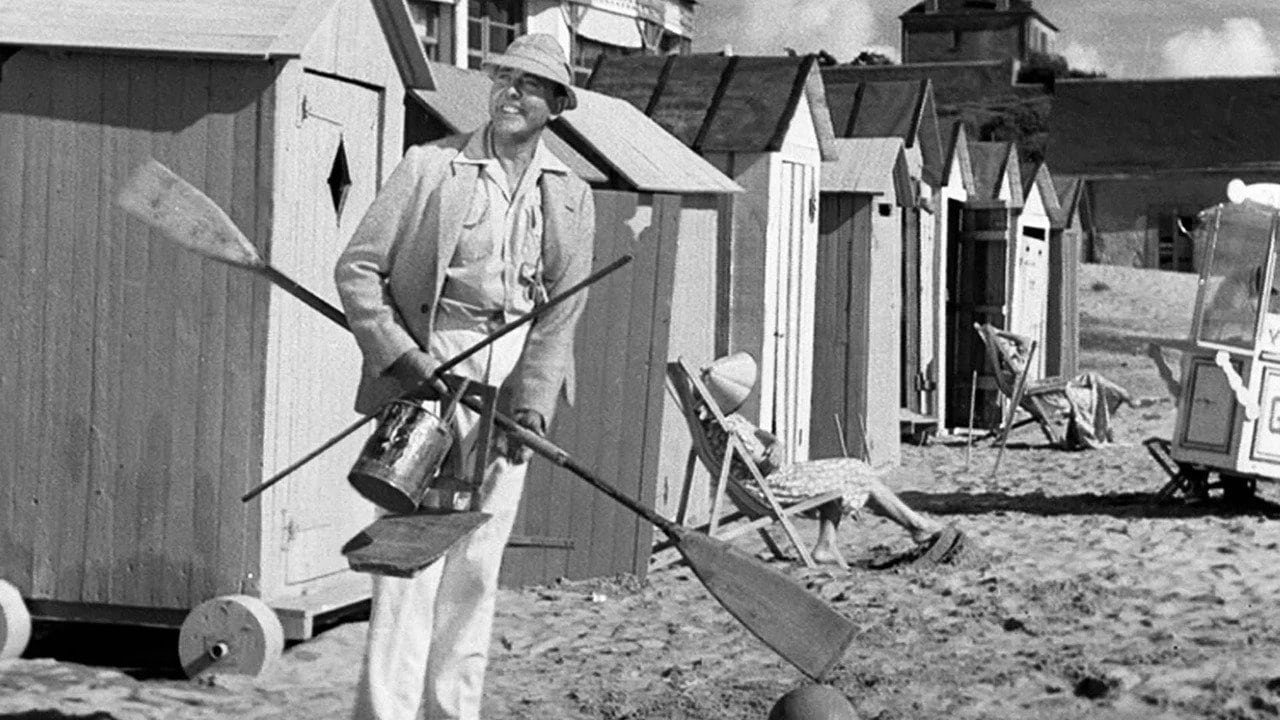Cinefill1
-Les Vacances de M. Hulot (released as Monsieur Hulot's Holiday in the UK and Mr. Hulot's Holiday in the US) is a 1953 French comedy film starring and directed by Jacques Tati. It introduced the pipe-smoking, well-meaning but clumsy character of Monsieur Hulot, who appears in Tati's subsequent films, including Mon Oncle (1959), Playtime (1967), and Trafic (1971). The film gained an international reputation for its creator when released in 1953. The film was very successful as it had a total of 5,071,920 admissions in France.--Critical response:-On its release in the United States, Bosley Crowther's review said that the film contained "much the same visual satire that we used to get in the 'silent' days from the pictures of Charlie Chaplin, Buster Keaton, and such as those." He said the film "exploded with merriment" and that Tati "is a long-legged, slightly pop-eyed gent whose talent for caricaturing the manners of human beings is robust and intense.... There is really no story to the picture.... The dialogue... is at a minimum, and it is used just to satirize the silly and pointless things that summer people say. Sounds of all sorts become firecrackers, tossed in for comical point." -Tati biographer David Bellos has described the film as "Sublime," and said that, "It was through this film that I first fell in love with France. I think that is true of a lot of people." The journalist Simon O'Hagan, writing on the occasion of the film's 50th anniversary in 2003, wrote that the film, "might contain the greatest collection of sight gags ever committed to celluloid, but it is the context in which they are placed and the atmosphere of the film that lift it into another realm. The central character is an unforgettable amalgam of bafflement at the modern world, eagerness to please and just the right amount of eccentricity - i.e. not too much - his every effort to fit in during his seaside holiday merely succeeds in creating chaos out of orderliness. Puncturing the veneer of the comfortably off at play is by no means the least of Tati's concerns. But, (there is) an elegiac quality (too), the sense that what Tati finds funny he also cherishes." -The film was entered into the 1953 Cannes Film Festival.
jrd_73
People are in a hurry to go on vacation. They rush to the train depot. They speed down the pavement. They are all in an absurd hurry to relax and have no patience for slower traffic or animals. One such slower vehicle is a loud jalopy. It stops in front of a dog sunning itself in the middle of the road. The vehicle's owner honks the horn which sounds delightfully odd. The dog wags its tail but does not move. The horn sounds again and, once again, the dog wags its tail. Finally, the dog gets curious and goes over to the car. A hand reaches out from the car and gently pets the dog before easing the car onward to its destination. The owner of the car is Monsieur Hulot and he, too, is going on vacation. The fact that he is not in a hurry like his fellow vacationers can be attributed to the fact that Hulot lives life at an unhurried pace something that many of his acquaintances neither understand nor appreciate. Hulot is a man who prefers animals to things, play over strategy, summer relaxation over summer business, and freedom over rigid order (the headwaiter at the hotel where Hulot stays is constantly befuddled by this guest).Monsieur Hulot's Holiday is a funny, touching, and humane look at a summer vacation. As viewers we follow Hulot, an earnest but clumsily unlucky man, through a few blissfully lazy summer days. We share his energy in play (tennis and ping pong). We feel his delight when dancing with a pretty girl at a masquerade party, where few adults have bothered to attend. We are painfully aware of Hulot's embarrassment as he dishes out abuse at a Tom who was not in fact peeping. We laugh, and cringe, at Hulot's valiant but doomed attempts to stop the escalation of an ill-timed fireworks display. Finally, at the film's conclusion, we sense the bittersweet quality with which Hulot ends his vacation, a vacation that has had humor and sadness, adventure and boredom, romance and dejection, in short a vacation full of life.Director and Hulot star Jacques Tati does not always succeed in making me laugh (although when he does, I laugh heartily), but he always makes me smile. This week was my third go around for Monsieur Hulot's Holiday. I first watched the film a decade ago. I predict I will watch it another three times in the next ten years. I see too many films that offer nothing. Monsieur Hulot's Holiday always leaves me smiling, if somewhat sadly, from ear to ear.
Andy Howlett
I don't know where I stand with regard to Jaques Tati. Since I first saw 'Les Vacances' when I was a teenager I knew he was a bit different from most other comic actors/writers. However, I don't think he is worth the over-the-top praise he sometimes gets. I now have the box-set of his films from BFI, and we are watching them in chronological order. 'Jour de Fete' is delightful, but Tati's style wasn't yet polished. He reaches his peak with 'Vacances' and 'Mon Oncle' in my view. I'm so glad he stuck to black & white photography for this film, I maintain that it captures the heat and light of a summer's day better than any colour process. Combined with the easy jazz music (very French) and the sound of distant voices on the beach, it conjures up a sunny holiday so well. Most of the humour is pretty low-key and incidental (just as Tati intended) but there are some flashes of real laugh-out-loud occurrences. One is where he is wearing the rambler's back-pack and the stopper pops out of the thermos flask and knocks his hat off. I wonder how many goes they had at that? The restoration is excellent. The image is clear, clean and stable and most of the scratches and dirt have been banished. I'm glad the team did not do any more, as it can lead to the final result looking more like video tape rather than film (witness many of the restored MGM musicals). One to savour occasionally.
random_avenger
The importance and influence of French comedy master Jacques Tati's most famous character Mr. Hulot is not to be underestimated: his nearly silent antics carry on the non-verbal tradition from the earliest decades of cinema and his iconic style lives on in more recent comedy characters such as Rowan Atkinson's Mr. Bean. The 1953 film classic Mr. Hulot's Holiday marks the first appearance of the lovable Monsieur and was also Tati's breakthrough success to international audiences.The plot of the movie is pretty neatly summarized by the title "Mr. Hulot's Holiday". At the beginning the eponymous clumsy and pipe-smoking but always polite loner (played by Tati himself) arrives in a sunny beach resort somewhere in France along with many other tourists ranging from a workaholic businessman to a politics-obsessed intellectual and a beautiful young woman named Martine (Nathalie Pascaud). Hulot is planning to take it easy on his holiday (like he always does) but it looks like his presence keeps inadvertently causing various unexpected incidents at the resort.Just like in the later Hulot films, Tati utters few words in the lead role and allows others do the talking when necessary. Most of the time he relies on visual gags that he finds in the most mundane of things: a swinging door at the hotel, the flowing sugar dough of an ice cream seller, a noisy jazz record, Hulot's malfunctioning antique car... In many scenes creative sound effects have a much bigger importance than dialogue: a squeaky car horn, a mumbly train station loudspeaker, the swinging door... Music is used more sparingly than could be expected, but the relaxing tunes on the soundtrack are a joy to listen whenever they are heard, even though the sound quality was not the best available in the version I saw.In spite of the sunny and light atmosphere that differs from the urban settings of the other Hulot movies, there is a very melancholic undercurrent running under the surface of the story. Hulot remains so alone from start to beginning (despite getting some attention from the beautiful Martine and the other tourists) that his character just cannot be dismissed as a mere buffoon. Even though he doesn't seem to mind spending time by himself, he is obviously out of place among the busy normalcy that surrounds him wherever he goes. At least to me this outsiderness is more than just nostalgia for "good old times" when such personalities had it easier to find their place in society; it is something that resonates with most people at one point or another in their lives. Like in the next Hulot film Mon oncle (1958), children are the ones who Hulot gets along with best... perhaps both share the feeling of being on a different level than the expected form of a responsible adult.Anyway, back to the movie... The first two times I saw Les vacances, I didn't care for it much since it felt too slow-paced and much longer than it actually is. Now, after having seen other Tati films and learning to appreciate comedies on a broader level than as simple joke automats, I notice I like Les vacances a lot more than before. It is not an aggressive laugh riot, nor does it attempt to be, but instead offers a nuanced tragicomic tale for more mature tastes. As one of the shorter Hulot movies, it can also serve as a good introduction to Tati's cinema, even though personally I saw the appeal of Mon oncle before Les vacances. At any rate, both films are classics worthy of their reputations, must-sees for film buffs and quietly amusing comedies in their own right.


 AD
AD

